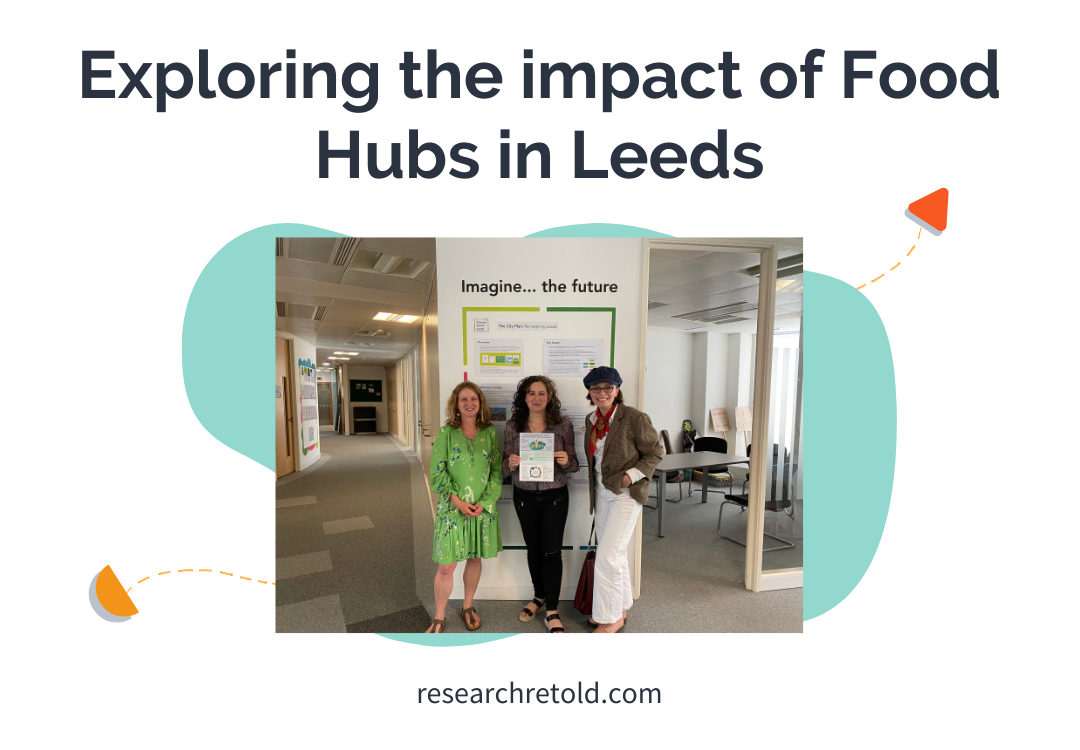As part of our commitment to support our clients and stay at the forefront of cutting-edge research, our director Mihaela Gruia recently attended a remarkable event at Climate Action Leeds Hub this week.
The event unveiled the latest research findings on the impact of Food Hubs in Leeds, accompanied by the launch of an impact evaluation toolkit. This toolkit promises to revolutionise the way food hubs measure their impact and bring about positive change. In this pose we share the highlights of this exciting event and explore the potential of food hubs to transform communities.
Setting the stage
The vibrant city of Leeds provided the backdrop for this remarkable occasion – home to nearly 50 Food Hubs and city with a bold and ambitious Leeds Food Strategy. Welcomed by a buzzing atmosphere, attendees gathered Climate Action leeds, nestled in the heart of Leeds, eager to discover the latest insights on food hub initiatives. Professionals, academics, and practitioners united under a shared passion for sustainable food systems.
Revealing the research findings
The event commenced with a captivating presentation by Dr Effie Papargyropoulou, Associate Professor in Sustainable Food Networks at the University of Leeds. Her talk was followed by Sonja Woodcock, Leeds Food Partnership Coordinator at Food Wise. They unveiled the latest research findings, which shed light on the tremendous impact of food hubs in Leeds. The research showcased how these community-driven initiatives have positively influenced various aspects of the local food system, such as reducing food waste, promoting local produce, and fostering social cohesion.
This research was conducted by the University of Leeds in collaboration with Leeds City Council, Food Wise Leeds and participating Food Hubs, funded by the Research England Policy Support Fund and supported by Policy@Leeds.
The Impact Evaluation Toolkit
A major highlight of the event was the launch of the impact evaluation toolkit, designed to empower food hubs worldwide with the means to measure and assess their impact effectively.This comprehensive toolkit promises to be a game-changer for food hubs, enabling them to gauge their influence on the environment, economy, and society. With its user-friendly formats (the toolkit is available as a fillable pdf and as an Excel spreadsheet), the toolkit offers an invaluable resource for both established food hubs and those just starting their journey.
Engaging Panel Discussions: To further enrich the event, engaging panel discussions were held, featuring renowned experts and practitioners in the field of sustainable food systems. These discussions provided a platform for participants to exchange ideas, share success stories, and brainstorm innovative strategies to enhance the impact of food hubs. The passion and dedication exhibited by the panelists were contagious, inspiring attendees to explore new avenues and ignite change within their own communities.
Networking and Collaboration: Throughout the event, attendees had the opportunity to network with like-minded individuals, forging connections and building relationships within the sustainable food community. Sharing experiences, challenges, and aspirations, participants discovered a sense of camaraderie that and shared purpose in supporting their communities and making Leeds a great city to live in. The atmosphere was abuzz with excitement as collaborations and future partnerships were forged, fostering a collective determination to drive the food hub movement forward.
Our collaboration with this project
Our role in this project went beyond mere attendance. As a research communication company, we had the privilege of working closely with the researchers to help communicate their findings in accessible and visually engaging ways. We collaborated with Dr Effie Papargyropoulou and Dr Gemma Bridge from the University of Leeds to produce a range of visually captivating materials that accompanied the launch of the research project. Our aim was to make the research easily understandable and relatable to a diverse audience. Together we produced:
- A 2-page policy brief on the benefits of Food Hubs
- A 22-page booklet with Food Hub case studies and the positive impact they have in the community
- The designed and accessible version of the toolkit as a fillable PDF and an Excel spreadsheet
Being present at the event allowed us to celebrate and support our clients, the researchers, as they shared their remarkable work with the community in Leeds. It was an incredible experience to witness the real-life impact of the materials we had developed. Seeing the attendees interact with and appreciate the visual resources we created reinforced our belief in the power of effective research communication.
We are immensely grateful for the opportunity to be part of this collaboration with the University of Leeds. Being able to bring the project to life visually through these materials was both rewarding and fulfilling. We firmly believe that effective communication plays a vital role in bridging the gap between research and its real-world application. It was an honor to contribute to the dissemination of knowledge and help facilitate the adoption of sustainable food practices through visually appealing and accessible materials.
We extend our gratitude to the researchers at the University of Leeds for their trust and partnership throughout this journey. Together, we have taken a significant step towards empowering food hubs around the world to measure and evaluate their impact effectively. We look forward to continued collaborations that drive positive change and pave the way for a more sustainable future.

